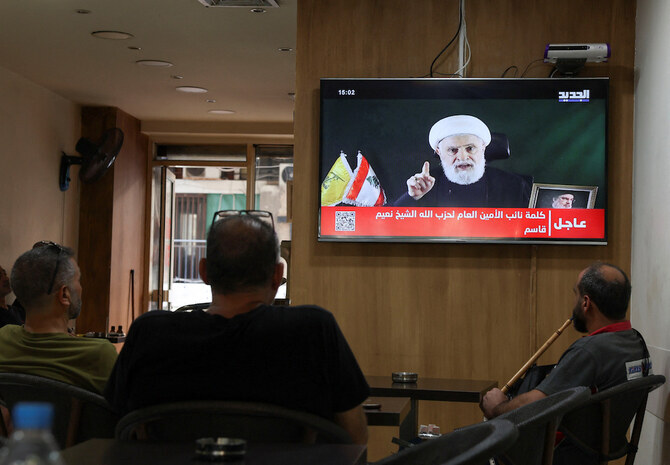BEIRUT: Clashes between the Israeli army and Hezbollah intensified on Tuesday as an Israeli infantry unit advanced on the outskirts of the border town of Rab El-Thalathine.
At the same time, Israel stepped up its airstrikes on numerous towns in southern Lebanon and the Bekaa Valley, resulting in mass casualties.
As tensions continued to escalate, calls by Lebanese politicians for a ceasefire grew and they urged the government to deploy army forces in the border region.
In a televised speech, however, Hezbollah’s deputy secretary-general, Sheikh Naim Qassem said “the party (Hezbollah) is strong and united.” Pictured alongside a Lebanese flag and the Hezbollah banner, he warned that “since the enemy has targeted all of Lebanon, we have the right, from a defensive standpoint, to target any point within the Israeli entity.”
He added: “The solution lies in a ceasefire. Following the ceasefire … the settlers will return to the north. However, as long as the conflict persists, the number of uninhabited settlements will increase, placing hundreds of thousands, potentially more than 2 million, at risk.”
Fouad Siniora, a former prime minister of Lebanon, called for “an immediate cessation of hostilities to halt the bloodshed … as well as a complete adherence to the constitution.”
The Kataeb Party called upon “the speaker of the parliament and the prime minister to urgently seek a definitive and unambiguous position from Hezbollah concerning the immediate acceptance of a ceasefire.”
Meanwhile, fighting continues. Hezbollah said its members “engaged in combat with the Israeli forces that infiltrated into the area of Rab El-Thalathine using automatic weapons and missiles, and the clashes are ongoing.”
Fighting also resumed in the border town of Aita Al-Shaab. The Israeli army has tried to cross the Blue Line and enter Lebanese territory in several places. The extent to which incursions have been successful remains unclear, other than video footage released by the Israeli army.
Meanwhile, more than 20 people were killed or injured when an airstrike hit a residential building in the town of Riyaq in Bekaa. Elsewhere, Mohammed Hassan Mashourab, an employee of internet provider Ogero, his wife Ghida Farhat and their children, Raine and Ali, were killed when an airstrike hit their house in the town of Jarjou, in Iqlim Al-Tuffah region.
Israel also targeted Qilya in Western Bekaa with a series of airstrikes, killing three paramedics from Hezbollah’s Islamic Health Organization. Similar attacks targeted Hosh Al-Sayyid Ali in Hermel, and the border area of Jarmash, near the border with Syria.
Parts of Baalbek in the vicinity of its Roman castle were also hit by airstrikes at dawn, described by residents as “the most violent of all times.” Neighboring Al-Murtada Hospital was severely damaged and forced to close.
Israeli forces said they “eliminated Khader Al-Abed, who was in charge of the area north of the Litani River with Hezbollah’s aerial unit.” Hezbollah did not immediately confirm this.
Israeli reconnaissance planes entered Lebanese airspace over Beirut and its suburbs and thermal balloons were deployed over the capital.
Army forces targeted a residential building in Ayto, a town in the Zgharta district of northern Lebanon and the death toll among civilians there rose to 23 on Tuesday, including women, children and the elderly, some of whom were reportedly “blown to pieces.”
Avichai Adraee, a spokesperson for the Israeli military, again warned residents of southern Lebanon on Tuesday “not to return to their villages in the south or to their olive groves.”
In a joint statement, the World Food Programme and UNICEF said “the humanitarian needs of displaced people in Lebanon are increasing. We need to mobilize efforts to provide additional funding to enable a scaled-up response.” A ceasefire is urgently required, they added.
According to the latest daily report issued by the Lebanese government, 200 Israeli airstrikes were recorded in the past 48 hours, bringing the total number of attacks on Lebanon since the start of hostilities just over a year ago to 9,866. The reported death toll stands at 2,309, with 10,782 people injured and 188,146 displaced and living in more than 1,000 shelters, the majority of them in Beirut and Mount Lebanon.
Lebanese citizens have received calls from Israeli authorities ordering them to evacuate their homes and other buildings in specific streets in many Lebanese regions because Hezbollah militants are sheltering in them, which has caused panic among residents.
Some of these calls, described as “psychological warfare,” were reported in Christian areas, including Sin El-Fil, Ballouneh and Hadath, causing chaos among residents and displaced people who thought they were in safe areas.



































